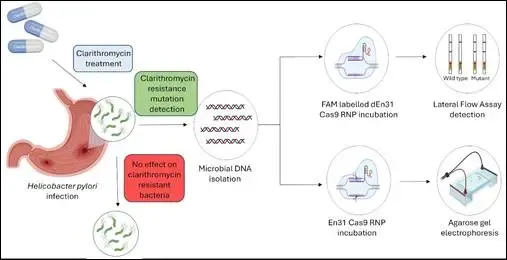CRISPR-Enhanced Diagnostic Tool for Identifying H. pylori, the Bacteria Linked to Ulcers and Gastric Cancer

New Delhi, Dec 27 (NationPress) A collective of Indian researchers, featuring members from the CSIR-Institute of Genomics and Integrative Biology (IGIB) and AIIMS, has pioneered a novel approach utilizing a CRISPR-based diagnostic tool called FELUDA for the identification of H. pylori bacteria, as reported by the Ministry of Science and Technology on Friday.
Infections caused by H. pylori are known to impact more than 43 percent of the global population. This bacterium can lead to various gastrointestinal issues, such as peptic ulcers, gastritis, dyspepsia, and even gastric cancer.
The research team devised a strategy to utilize FELUDA as a point-of-care diagnostic service, offering an affordable solution for the detection of H. pylori and its mutations in patients suffering from indigestion. The study focused on individuals from rural regions in India, where access to diagnostic facilities is limited or nonexistent. FELUDA stands for FnCas9 Editor Linked Uniform Detection Assay.
Gastric biopsy samples from patients experiencing dyspepsia were analyzed using both in vitro cleavage experiments and lateral flow-based test strip assays (FELUDA).
The findings confirmed the capability of en31-FnCas9 to effectively detect the presence and determine the 23S rDNA mutation status of H. pylori in gastric biopsy samples from dyspeptic patients.
The published paper in the Microchemical Journal emphasizes the importance of sequencing-free molecular diagnostics in identifying H. pylori and its antibiotic-resistance mutations. The results underline the necessity of personalized treatment strategies to tackle global health challenges associated with antibiotic resistance and the risks of gastric cancer.
Combining en31-FnCas9-based detection with the lateral flow assay (FELUDA) exhibited quick detection of H. pylori infection and its mutation status, enhancing its diagnostic usefulness in clinical environments.
“Thus, the incorporation of innovative diagnostic techniques as cost-effective tools for detecting the presence of H. pylori in human samples, along with identifying antibiotic susceptibility, is vital for its swift eradication,” the research team stated.








